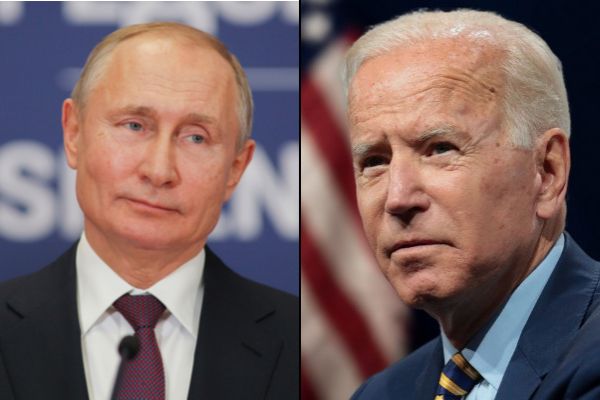As war continues to rage in both the Middle East and Eastern Europe, the world appears to once again be witnessing the rise of global blocs locked in confrontation.
By Yaakov Lappin, JNS
As tensions between Israel and the Iranian axis mount in the Middle East, the United States and Russia are playing increasingly prominent and competing roles in the region.
Russia’s dependence on Iran has significantly intensified in light of its ongoing war against Ukraine, which it appears to have recently repaid by helping the Islamic Republic increase its readiness for further direct conflict with Israel.
Faced with the depletion of its own missile stockpiles, Russia has turned to Iran for critical supplies.
Iran has reportedly provided Russia with around 400 surface-to-surface ballistic missiles, including models from the Fateh-110 family, which are crucial for Russia’s operational capabilities.
Additionally, Iran has supplied thousands of drones, notably the Shahed-136, which have been used extensively in Ukraine.
Iran’s support for Russia extends to significant production assistance.
The Islamic Republic has helped establish a production factory on Russian soil dedicated to manufacturing 10,000 Iranian-designed drones a year, according to a February report by Defense One.
It appears as if the payback from Russia is materializing. According to a report by The New York Times on Tuesday, Russia has begun delivering advanced radars and air-defense equipment to Iran.
There are also unconfirmed reports that Iran has received electronic warfare systems from Russia to enhance its defenses.
Meanwhile, Tehran continues to press Russia to deliver SU-35 fighter jets.
At the same time, Russian President Vladimir Putin has reportedly advised Iran’s Supreme Leader Ayatollah Ali Khamenei to exercise restraint following the July 31 assassination of Hamas political bureau chief Ismail Haniyeh in Tehran.
Tehran has blamed Israel for the killing and threatened to retaliate.
According to Reuters, Putin, through Sergei Shoigu, Secretary of the Russian Security Council, recommended that Iran avoid striking Israeli civilian targets.
In Yemen, Russia’s involvement has deepened, with the Middle East Eye citing United States officials on Aug. 2 regarding the presence of Russian military intelligence in the country.
Russian officers are reportedly advising the Houthis on targeting vessels in the Red Sea.
Parallel concerns have been raised about potential Russian arms supplies to the Houthis, as raised in a report by CNN the same day, with Russia reportedly canceling at the last minute plans to supply the Houthis with weapons.
The Russian supplies were intended as a means of pressuring Washington over its support for Ukraine.
The cancellation followed U.S. and Saudi pressure on Moscow, according to the report.
Russia’s support for Iran highlights its intent to counter U.S. influence and strengthen its foothold in the region, which is already significant due to Russia’s near decade-long military presence in Syria, on Israel’s doorstep.
Conversely, the United States has been attempting to stabilize the region through a mix of intensive diplomacy and a military presence which has mostly focused on defensive missions, with limited offensive strikes on Iran-backed forces in Yemen and Iraq.
In recent days, the United States has again boosted its military presence and posture in the Middle East.
Gen. Michael Erik Kurilla, Commander of U.S. Central Command (CENTCOM), which is responsible for the Middle East, visited Israel on Monday for joint situational assessments with IDF Chief of Staff Lt. Gen. Herzi Halevi and Defense Minister Yoav Gallant.
The three discussed defensive and offensive operational plans ahead of the expected Iranian-axis attack.
The Pentagon announced on Aug. 2 the deployment of additional military assets to the Middle East, including F-22 Raptor fighter jets, ballistic missile defense-capable Navy cruisers, and destroyers.
According to Professor Robert Freedman, a leading U.S. expert on Israel, the Middle East, and American foreign policy, “Russia does not want an Israeli-Iranian war, as it demonstrated in April.”
Such a war “would pose problems of choice for Russia and, most likely, interfere in Iranian arms deliveries to Russia,” he told JNS.
Freedman, who has advised policymakers in the State Department, the Central Intelligence Agency, the Israeli Defense Ministry, and the Israeli Foreign Ministry, added that, “Despite having an air base and a naval base in Syria, Russia simply does not have the firepower the United States has in the region.”
Indeed, he continued, “it has withdrawn some of its assets from Syria and its Black Sea fleet, badly hurt by Ukraine, seems bottled up there.”
Thus, “The display of U.S. power in the region will reassure U.S. allies, not just Israel, and may serve to deter Iran from a larger response to the Haniyeh assassination than they would have liked,” he said.
One thing appears clear going forward: As war continues to rage in both the Middle East and Eastern Europe, the world appears to once again be witnessing the rise of global blocs locked in confrontation.





